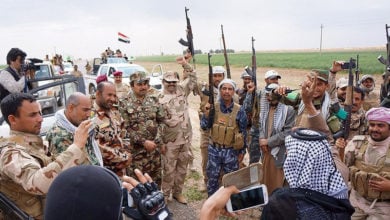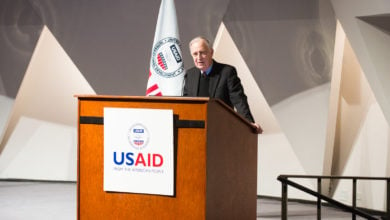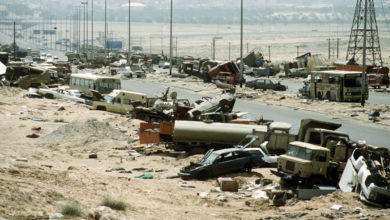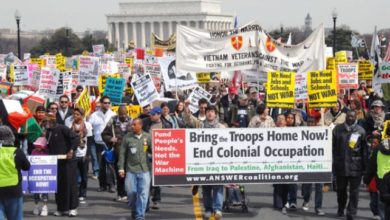 Before the U.S. occupation, rationing insured that every Iraqi had a minimal supply of food to equitably cope with the sanctions. Photo: Bill Hackwell |
“Astonishing” because between 1991 and 2003, more than one million Iraqis-half of them children under the age of five, according to international humanitarian aid organizations-had died as a direct result of the U.S./UN sanctions and blockade inflicted on their country. The deadly sanctions were officially explained as a means to force Iraq to give up its weapons of mass destruction. Now Duelfer admits to the world, the weapons that were used to justify such a genocidal policy had ceased to exist months after the sanctions were put in place.
Neither Duelfer nor the assembled Senators offered apologies to the countless Iraqi mothers and fathers who watched helplessly while their children died from dirty water and the lack of the simplest medicines. There were no pleas for forgiveness extended to sons, daughters and grandchildren who witnessed elderly relatives go through unbearable agony from terminal diseases like cancer without the benefit of even an aspirin to ease the pain. Not the slightest sign of remorse from the architects, technicians and enforcers of the sanctions that nearly destroyed a country.
“Sanctions” was really a polite-sounding term for what was in reality “the most complete blockade of any country in modern history.” That’s how they were proudly described by Samuel Berger, the National Security Advisor to President Clinton during his second term.
Before the first U.S. war on Iraq, some in the anti-war movement raised the slogan, “Sanctions, Not War.” Other more progressive forces objected, pointing out that blockading a country in fact is an act of war. The sanctions on Iraq were imposed Aug. 6, 1990, by the UN Security Council at the behest of its U.S. ambassador, four days after Iraqi troops had occupied Kuwait following a long dispute between the two states.
The sanctions imposed on Iraq were unprecedented in modern history. Neither apartheid South Africa, nor fascist Spain, nor any of the imperialist “great powers” that carried out mass murder in their far-flung empires ever faced such economic isolation.
The UN sanctions forbade any country in the world from trading with Iraq. To enforce the prohibition, the U.S. Navy monitored or boarded all ships in the Persian/Arabian Gulf and the Gulf of Aqaba that could conceivably have had cargo headed to Iraq.
Iraq’s foreign trade came to a grinding halt almost overnight. The entire basis for Iraq’s development and modern economy was the export of oil. Oil exports provided the revenue to import 70 percent of the country’s food, 65 percent of its medicine, and many types of raw materials, capital, consumer and infrastructure goods.
The consequences of shutting down foreign trade for a country like Iraq were entirely predictable and long recognized by Washington policy makers. Their intent was to inflict pain on the Iraqi people as a whole.
The sanction regime brings to mind the words of President Woodrow Wilson in 1919 when describing the imperialist blockade against revolutionary Russia: “The one who chooses this economic, peaceful, quiet, lethal remedy will not have to resort to force. It is a painful remedy. It doesn’t take a single human life outside the country exposed to the boycott, but instead subjects that country to a pressure that, in my view, no modern country can withstand.”
Within a few months, even before the six-week bombing war began on Jan. 17, 1991, death rates were rising in Iraq as hospitals ran out of medicine. During the war itself, the entire civilian infrastructure of Iraq was targeted and largely destroyed. Water, sewage treatment, electrical power and phone systems, food production, industrial and pharmaceutical factories, schools, hospitals, and bridges were relentlessly bombed and destroyed by the U.S., British and French air forces.
The blockade and the bombing campaign went hand-in-hand. Rebuilding the destroyed civilian infrastructure was greatly hampered by Iraq’s inability to import anything. Spare parts were used up in the reconstruction effort, leaving little for future repairs and replacement.
A long-term process of deteriorating vital facilities set in. Most devastating to the population was the country’s decreasing ability to provide clean water. The problem was especially acute due to the very limited rainfall and the Iraqi population’s dependence on the Tigris and Euphrates Rivers for both drinking water and sewage disposal.
Lack of clean water was the root cause for Iraq’s soaring death rate in the 1990s. Over the next decade, 7,000 to 10,000 people died each month as a result of the sanctions. Even those who remained relatively healthy endured a catastrophic decline in living standards. The Iraqi dinar, formerly worth three U.S. dollars, became almost worthless, falling to 2,500 to the dollar by the mid-1990s.
Despite a rationing system that was widely acclaimed for accessibility and equality, the food supply deteriorated severely. The average Iraqi’s caloric in take was reduced by more than half, from 2900 calories per day to less than 1300 at its low point. Hospitals lacked spare parts for x-ray and dialysis machines and had almost no medicines available.
Shifting justifications
Most of the world assumed that Iraq’s withdrawal from Kuwait would lead to an end to the sanctions. But in the spring of 1991, at the U.S. behest, the UN Security Council passed new resolutions, making the end of the blockade conditional on Iraq’s destruction of its weapons of mass destruction.
The Pentagon and U.S. CIA became the chief organizers of the UN weapons inspection teams, known as UNSCOM. Over the next 12 years, right up to the 2003 U.S. invasion of Iraq, the sanctions would remain in place, while the weapons inspectors conducted an endless “search” for weapons.
In late 1997, Clinton administration officials-including President Clinton himself-stated that the sanctions on Iraq would never be lifted as long as the Iraqi government headed by Saddam Hussein remained in power. In October 1998, Clinton signed into law the “Iraq Liberation Act,” making “regime change” in Iraq the official policy of the United States government.
Month after month, year after year, the inspections went on. And, month after month, year after year, the dying went on in Iraq.
Now, the CIA blandly reports, that all of Iraq’s stockpiles of WMD were, in fact, destroyed in 1991. As the Oct. 8 New York Times reported matter-of-factly: “Mr. Duelfer said that he had concluded that between 1991 and 2003, Mr. Hussein had in effect sacrificed Iraq’s illicit weapons to the larger goal of winning an end to the United Nations sanctions.”
 U.S.-imposed sanctions prevented the reconstruction of Iraq’s civilian infrastructure. Photo: Bill Hackwell |
In reality, the Pentagon and White House, possessing the most powerful military machine ever assembled, never feared Iraq’s weaponry. Why then did the U.S. insist on keeping the weapons inspections and sanctions in place for so many years?
The real aims of the UN weapons inspection program in Iraq were two-fold. On one hand, the UN teams were staffed with spies, who were delivering information to the intelligence services of the U.S., Britain and Israel. This fact was reported in a series of Washington Post articles beginning on Jan. 6, 1999. They were providing vital targeting information for frequent U.S. bombing raids on key Iraqi facilities. They reported on the whereabouts of high-ranking Iraqi leaders. And they played a key role in attempted coups against the Iraqi government in the mid-1990s, supplying critical information to the coup plotters, including the present puppet “prime minister” of Iraq, Iyad Allawi.
The other aim of the weapons inspections was to destroy Iraq’s ability to defend itself in order to ease the way for a future attack. By the time of the U.S.-British invasion in March 2003, Iraq was vastly weaker militarily than it was at the end of the first Gulf War.
On the very day of the invasion, March 20, 2003, Iraq was still destroying short-range Al-Samud missiles, whose range slightly exceeded the allowable 90 miles. This, under the watchful eyes of UN inspectors.
From the very beginning, the weapons inspections program, along with the sanctions, was justified on the basis of lies and deception. Weapons inspections, sanctions, bombing and coup attempts were all elements of an unfolding U.S. strategy in which the tactics varied, but the goal remained the same: reducing Iraq to the status of a neo-colony and bringing its vast oil resources under the control of the U.S.
When these tactics failed to achieve their objective, the old lies were recycled to justify an all-out military invasion and colonial-style occupation.
Resistance and elections
Not surprisingly, the U.S. was able to quickly overrun Iraq’s regular army in March and April of 2003. But it has not succeeded in crushing the Iraqi people.
Over the past 18 months, an increasingly powerful popular resistance movement has developed inside the country. The resistance is particularly strong in central and western Iraq.
By mid-summer 2004, U.S. forces had withdrawn from at least two dozen Iraqi cities. Motivating the decision to pull back was concern over the impact on public opinion of rising U.S. casualties as the presidential election approached.
Disillusionment with the war has grown in the U.S. as more people are aware that Iraq had none of its much-advertised WMD, and as the numbers of dead and wounded relentlessly escalated. Discontent and opposition has also spread inside the military.
Pulling back from many cities gave the insurgent resistance forces new space to organize and grow. Between March and August of this year, monthly attacks on U.S. troops rose from 700 to 2700.
While President Bush has attempted to portray the occupation as “improving,” he has been contradicted by high-ranking members of his own government. On Sept. 26, Secretary of State Colin Powell said, “We are fighting an intense insurgency. Yes, it’s getting worse.”
Iraqi resistance forces view the election set for January 2005 as part of the U.S. plan to turn their country into a stable neo-colony. The election is being openly organized and directed from the huge U.S. embassy in Iraq, headed by the infamous John Negroponte. Negroponte rose to prominence in the 1980s as a key figure in the U.S. counterrevolutionary wars in Central America.
Washington is pouring millions of dollars into parties that it favors in Iraq in preparation for the election. Most of these parties are led by former exiles with little connection to the Iraqi population.
After denying reports that the U.S. was covertly intervening in the upcoming election, Powell told CNN: “I don’t discuss covert programs, but I will say that we do have overt programs and everybody knows about them. We will be providing assistance for capacity building in parties so that we can see a political system come alive in both Iraq and Afghanistan and we’ll be doing it overtly.”
In order for the election to have any credibility, voting must take place all across Iraq, including the cities and towns now under resistance control.
“When this [Nov. 2 U.S.] election’s over, you’ll see us move very vigorously,” a senior administration official told the Oct. 11 Los Angeles Times. “Once you’re past the election, it changes the political ramifications. … We’re not on hold right now. We’re just not as aggressive.”
But in early October, the U.S. military and elements of its new puppet army began to attack some cities, including Samarra, Tal Afar, the Sadr City area of Baghdad and elsewhere, inflicting heavy casualties on the population. At the same time air strikes on civilian areas in resistance strongholds like Fallujah and Ramadi have been stepped up, in order to prepare the way for an all-out assault.
The anticipated post-Nov. 2 offensive is not likely to depend on who is elected. Kerry and Bush proclaimed their intention to achieve “victory” in Iraq.
It is most appropriate that the ANSWER (Act Now to Stop War and End Racism) Coalition has called for counter-inaugural protests with the main slogan “End Occupation-Bring the Troops Home Now!”






